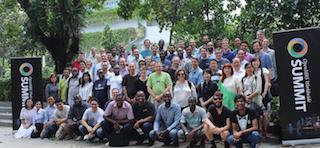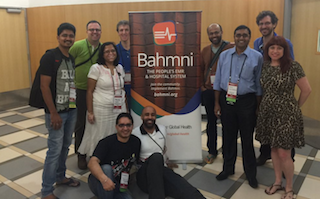Team Bahmni at the OpenMRS Worldwide Summit
This is a report on the OpenMRS Worldwide Summit that took place in Singapore last December. The author, Gurpreet Luthra, is currently the Community Lead for Bahmni, an open source Hospital Management System built using OpenMRS by ThoughtWorks. Previously Luthra managed the Humanitarian Open Source Program within ThoughtWorks. The program channeled ThoughtWork's contributions to socially impactful projects like OpenMRS and RapidFTR.
 ThoughtWorks first began contributing to OpenMRS in 2006 and since that time, we've had over fifty committers to OpenMRS in GitHub. Incidentally, one in every seven OpenMRS contributor in GitHub is a ThoughtWorker! Naturally, in 2013, when we had the opportunity to build Bahmni, an open source Hospital Information System (HIS), we chose OpenMRS as the underlying Electronic Medical Records System (EMR).
ThoughtWorks first began contributing to OpenMRS in 2006 and since that time, we've had over fifty committers to OpenMRS in GitHub. Incidentally, one in every seven OpenMRS contributor in GitHub is a ThoughtWorker! Naturally, in 2013, when we had the opportunity to build Bahmni, an open source Hospital Information System (HIS), we chose OpenMRS as the underlying Electronic Medical Records System (EMR).
Bahmni leverages the mature data model and application programming interfaces (APIs) of OpenMRS, while providing an out-of-the-box system that can be immediately used by hospitals. Plus, Bahmni provides a complete hospital solution, extending beyond an EMR, into a Laboratory Information System, Pharmacy system, and Billing system - leveraging open source products like Odoo, OpenELIS and Dcm4CHE among others. We call Bahmni a solution standing on the shoulders of giants.
In early December 2015, the ThoughtWorks Global Health team participated at the OpenMRS Worldwide Summit in Singapore, where we proudly showcased Bahmni, as it exists today.
I have found the OpenMRS implementers meet to be a great place to network with like-minded OpenMRS community members. In fact, I previously participated at the OpenMRS Implementers Meeting in Eldoret, Kenya. This year as well, we hoped that the OpenMRS Summit would provide us with a great opportunity to share Bahmni achievements and present plans for the upcoming year.
Many people in the OpenMRS community had briefly heard about Bahmni, but were unsure of its features and roadmap. We wanted to showcase Bahmni, share our challenges, learnings, and also get inputs from the community, on how we can help in driving adoption of OpenMRS via Bahmni.
 OpenMRS 2015 participants
OpenMRS 2015 participants
The Summit
The OpenMRS implementers are in the best position to understand Bahmni, and take it to hospitals and settings that really need it. Quite a few folks from the ThoughtWorks Global Health team attended the conference, since we expected a wide spectrum of attendees, questions and interest.
The OpenMRS Summit was hosted in Singapore, at the Singapore Management University. The 3 day summit had a large agenda, with multiple tracks. One of my favorite sections of the conference, was the Lightning Talks. These were short five minute talks on various topics ranging from the joy of participating in Google summer of code, to OpenMRS deployed in Sierra Leone to treat Ebola patients, a quick intro to Project Buendia (an open-source medical record system designed for relief missions) and the experience of deploying OpenMRS in Liberia by Partners-in-Health (PIH).
 The ThoughtWorks Team at OpenMRS 2015
The ThoughtWorks Team at OpenMRS 2015
Pankaj Kanchankar from our team gave an impressive first-preview of Bahmni during his lightning talk titled 'Creating Clinical Forms in less than 30 minutes'. It piqued interest in Bahmni, and set the stage for the next thirty minute slot, where Vivek Singh spoke about the origins of Bahmni, the JSS story, Bahmni roadmap, and the plan for engaging with the community. Vivek is a passionate speaker, with remarkable knowledge about the OpenMRS ecosystem. His talk was really well received as it provided clarity on many issues and questions that the community had around Bahmni. He called out to implementers to help implement Bahmni around the world, and this really resonated with many in the audience.
Later in the day, Vinay and Hemant took a hands on session on configuring Bahmni. For the session, they had created Digital Ocean droplets pre-installed with Bahmni, and a step-by-step training exercise, where the attendees had to configure Bahmni by themselves. And boy, the session was a hit! The classroom was choc-a-bloc, with people sprawled on the floor, to learn Bahmni. In fact, people were so excited about Bahmni, that we scheduled a second session in the ThoughtWorks Singapore office that evening.
 Bahmni Classroom session by Hemant and Vinay VenuI participated in a fishbowl session on building a stronger and more effective OpenMRS community, and also presented a talk on Lessons Learnt in Deploying an EMR in rural India. The talk was well received, with many attendees sharing their own experiences and challenges when deploying systems in resource constrained environments.
Bahmni Classroom session by Hemant and Vinay VenuI participated in a fishbowl session on building a stronger and more effective OpenMRS community, and also presented a talk on Lessons Learnt in Deploying an EMR in rural India. The talk was well received, with many attendees sharing their own experiences and challenges when deploying systems in resource constrained environments.
The OpenMRS leadership was very keen to understand how Bahmni and the OpenMRS communities can interact moving forward; how the Bahmni roadmap can be influenced by implementers; and. how a mutually beneficial relationship can be built. Many meetings around next steps, roadmap planning, open community design, and release planning were carried out. We gained some really useful insights into next steps for Bahmni, and the motivations and concerns of folks from the OpenMRS community. Thankfully, we had a solid team representing ThoughtWorks, and many concrete next steps were agreed upon.
A Great Start to 2016
The OpenMRS summit turned out to be a wonderful event to showcase Bahmni, and shed light on the desire of ThoughtWorks to provide implementers with a ready-to-use, sophisticated, end-to-end product for resource-constrained hospitals. The team also benefited immensely from the OpenMRS community’s feedback and experience in the Open Source EMR space, and came back ready to aim high for 2016.
 Fishbowl on OpenMRS Community DevelopmentWe realized that there is high interest and and a great opportunity to impact healthcare via an easy to implement solution like Bahmni. But we need to tap into the OpenMRS community for their domain knowledge, guidance and feedback in terms of the design, roadmap and suggestions to improve. The ThoughtWorks development team will need to be careful and stay away from private decision making, and instead, lean on collaborative design meetings and showcases with the community. We also need to figure out tooling to ensure that community participation becomes easy. It is important to hear the voice of each and every implementer, so that Bahmni can be easy to install, configure, adopt and maintain. Figuring out a model for effective global product support, is also something on our radar.
Fishbowl on OpenMRS Community DevelopmentWe realized that there is high interest and and a great opportunity to impact healthcare via an easy to implement solution like Bahmni. But we need to tap into the OpenMRS community for their domain knowledge, guidance and feedback in terms of the design, roadmap and suggestions to improve. The ThoughtWorks development team will need to be careful and stay away from private decision making, and instead, lean on collaborative design meetings and showcases with the community. We also need to figure out tooling to ensure that community participation becomes easy. It is important to hear the voice of each and every implementer, so that Bahmni can be easy to install, configure, adopt and maintain. Figuring out a model for effective global product support, is also something on our radar.
We couldn’t ask for a better gathering than the OpenMRS Summit for participants to learn, discuss and share experiences about the role of technology and software in public health. Thanks to everyone who is part of OpenMRS for creating a great product, and a world class community.
Further References:
- ThoughtWorks Global Health
- OpenMRS
- OpenMRS Summit Event Stream on Twitter
- Project Buendia
- Experience of deploying OpenMRS in Liberia (PIH)
- Creating Clinical Forms in 30 mins (Pankaj’s slides)
- Scaling Bahmni to multiple countries (Vivek’s slides)
- Hands on Session on Bahmni configuration (Hemanth and Vinay)
| Team Bahmni at the OpenMRS Worldwide Summit was authored by Gurpreet Luthra and published in the ThoughtWorks Insight blog. It is reprinted by Open Health News with permission. The original post can be found here. |
- Tags:
- Application Programming Interfaces (APIs)
- Bahmni
- Bahmni roadmap
- Billing system
- Dcm4CHE
- Ebola patients
- Electronic Medical Records System (EMR)
- Google Summer of Code
- Gurpreet Luthra
- Hospital Management System (HIS)
- Humanitarian Open Source Program
- India
- Kenya
- Laboratory system
- Liberia
- Lightning Talks
- mature data model
- Odoo
- open health
- open source EHR
- open source EMR
- open source HIS
- open source products
- open source software (OSS)
- OpenELIS
- OpenMRS Worldwide Summit
- Pankaj Kanchankar
- Partners-in-Health (PIH)
- Pharmacy System
- Project Buendia
- RapidFTR
- resource constrained environments
- Sierra Leone
- Singapore
- Singapore Management University
- Team Bahmni
- ThoughtWorks
- ThoughtWorks Global Health team
- Vivek Singh
- Login to post comments